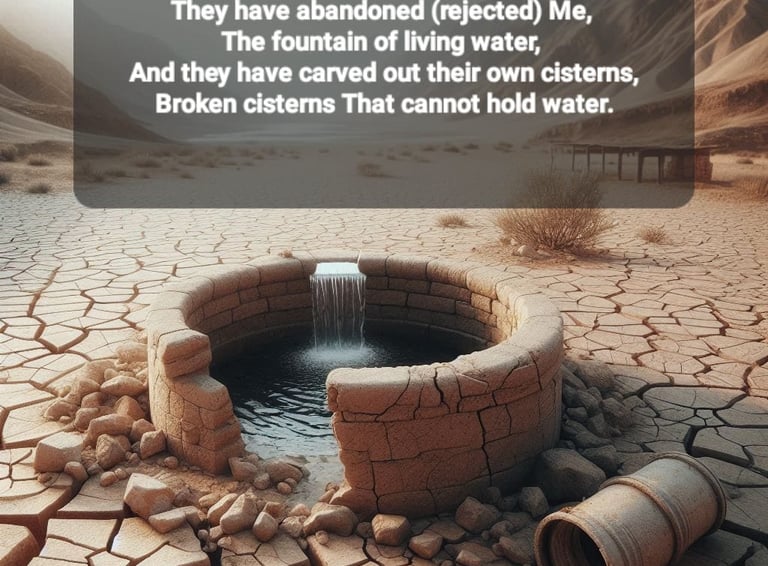Add your promotional text...
The spiritual condition of many individuals ...
The spiritual condition of many individuals
NITA ORSMOND
10/1/20242 min read


In today’s world, Jeremiah 2:13 speaks profoundly to the spiritual condition of many individuals and societies. The two evils that God identified in ancient Israel—abandoning Him and creating broken cisterns—are still relevant today, albeit in different forms.
1. Abandoning God:
- Modern-Day Secularism: Many societies today are increasingly secular, where belief in God is often marginalized or dismissed. This abandonment can be seen in the shift away from religious values and the embrace of a worldview that often excludes God from public life, education, and even personal decision-making.
- Religious Apathy: Even within religious communities, there is sometimes a tendency to take God for granted, neglecting a vibrant, personal relationship with Him. Instead of relying on God, people might rely on their own understanding, technology, or social structures.
2. Creating Broken Cisterns:
- Materialism: In today’s consumer-driven culture, many seek fulfillment in material possessions, wealth, and status. These are the modern “broken cisterns” that promise happiness but often lead to emptiness. Despite accumulating more, the satisfaction is fleeting, much like trying to store water in a broken vessel.
- Technology and Social Media: While technology and social media can be beneficial, they can also become cisterns that people turn to for identity, validation, and connection. However, these platforms often leave users feeling more isolated, anxious, and unfulfilled.
- Addictions: Many turn to substances, entertainment, or other addictive behaviors as a means to escape or find temporary pleasure. These too are broken cisterns—short-term solutions that ultimately fail to address deeper spiritual needs.
- Political and Ideological Idolatry: Some place their ultimate hope in political movements, ideologies, or leaders, thinking these will solve all their problems. While these can address important issues, they are insufficient as ultimate sources of hope and security, and often disappoint.
The Consequences Today:
- Spiritual Drought: Just as the Israelites experienced a spiritual drought by abandoning the living water, today’s society often experiences a similar drought—marked by anxiety, depression, and a pervasive sense of meaninglessness. People are spiritually thirsty but look to things that cannot satisfy.
- Fragmentation: The broken cisterns of today lead to fragmentation in personal lives and communities. People may feel disconnected, disillusioned, and divided, as the substitutes they rely on fail to bring the unity and wholeness that only God can provide.
The Call to Return:
- Rediscovering God: Just as Jeremiah called Israel to return to God, today there is a call for individuals and societies to rediscover their need for the true source of life—God Himself. This might involve a personal return to prayer, scripture, and worship, or a societal recognition of the need for spiritual renewal.
- Replacing Broken Cisterns: This also involves turning away from the false sources of security and satisfaction that dominate modern life. It’s an invitation to reorient priorities, placing God at the center rather than relying on transient or unreliable substitutes.
In summary, Jeremiah 2:13 challenges us to examine where we seek fulfillment in today’s world. It reminds us that only God, the fountain of living water, can truly satisfy our deepest needs, and warns us of the emptiness that comes from relying on anything else.
